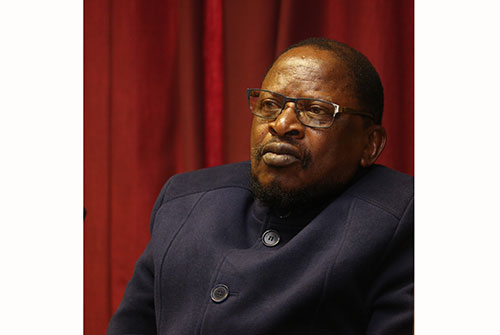A majority of National Council parliamentarians have rallied behind Swapo member of parliament Jerry Ekandjo’s private member’s bill in opposing same-sex marriages in Namibia.
Maudjuu, as Ekandjo is affectionately known, introduced the bill in the National Assembly earlier this month, with the aim of amending the Marriages Act of 1961 with a view to outlaw same-sex marriages in Namibia. Ekandjo wants the bill to provide a precise definition of the term ‘spouse’ in tandem with Namibia’s definition of marriage.
The bill sailed through the National Council.
The MPs premised their support for the bill on moral and/or religious beliefs and concerns about the potential extinction of mankind.
Among the proponents of the bill is Christopher Likuwa, the councillor of the Tobias Hainyeko constituency.
Likuwa strongly theorised that endorsing same-sex marriages forms part of an agenda that could have detrimental effects on future generations, potentially leading to the extinction of humankind.
“Yes, we are denying killing but the reason for this same-sex marriage is to kill the generation of tomorrow. They will marry to produce what? Water, salt, or what? If they produce zero [children], this means they are planning to kill the next generation and the future. Who will be the next members of parliament after 30 years? Therefore, we thank and appreciate this bill and we call upon every Namibian to support it because marriage is between a man and a woman to produce the next generation and leaders of tomorrow,” the Swapo lawmaker advanced.
Likuwa further reasoned that in the event of magistrates marrying men with men and women with women, a question arises: “Who will bless them?”
According to the lawmaker, Namibia is predominantly a Christian nation, underscoring the significance of religious values in the context of matrimonial unions.
“Seriously, after this bill, every Namibian found doing these things must be punished; a serious punishment,” he suggested in a punitive tone.
Echoing similar sentiments and offering clarification on the term “kill”, National Council vice chairperson Victoria Kauma said the term should not be taken literally.
Rather, it is used figuratively to signify that if same-sex marriage is to be allowed in Namibia, “there would be no country anymore”.
“There would be no people, and if there is a country with no people, what does that mean?” Kauma wanted to know.
Conversely, Sebastian !Gobs, the councillor for the Khorixas constituency, pointed out that the matter of same-sex marriage, in any form, is foreign to Namibia.
“It has never been a subject of consideration in Namibian studies, nor is it explicitly defined or practised anywhere in society,” he propelled his argument.
“Thus, I would rather support marriage in a way known to me and known by the majority of society according to our cultures and norms. Marriage is legally and formally recognised as a union of two people in a personal relationship and it is usually between a man and a woman and is regulated by laws, rules, customs, beliefs and attitudes that prescribe the rights and duties of the partners and accords status to their offspring,” he noted.
For him, marriage is more than just a civil contract with legal benefits, but “part of God’s plan”.
The bill also garnered support from other members, including Leonard Shikulo of the Okahao constituency, Hans Nambondi from the Okankolo constituency, Gobabis’ Tebele Augustinus and Harald Kambrude from the Rehoboth Urban West constituency.
They all advocate for the bill on the grounds of preserving family values and ensuring the maintenance of social order and harmony in society.
Rushed
In contrast, Paulus Mbangu, the councillor representing the Kavango East region, believes the bill was hastily drafted and lacked thorough deliberation before being presented.
Mbangu issued a warning about the dangers of rushing bills, expressing concerns that if there are any loopholes, they could come back to haunt lawmakers.
“This winter session will go down in the history of the country as the session in which both the National Assembly and National Council rushed bills.
“The Marriage Amendment Bill is now the 15th bill that we are passing within three weeks and I think it is a lesson to us that going forward, we should never try to expedite bills in the fashion that we have conducted these,” Mbangu cautioned.
It is also his fervent position that rushing the bill undermines the integrity of the legislative process.
He then urged the government to demonstrate commitment to avoid such practices and maintain public trust in democracy.
“Proper scrutiny of legislation is crucial for upholding trust in our parliamentary systems, and it is essential to ensure that this process is conducted meticulously and with due diligence. Therefore, it is important to debate reports going forward,” he said.
The council also reviewed the bill to change sections of the Marriage Act, including to define the terms marriage, same-sex marriage and spouse.
The bill further seeks to prohibit same-sex marriage, prohibit the solemnisation of same-sex marriages, and deny the recognition of same-sex marriages.
In May, the Supreme Court directed the Namibian government to recognise same-sex marriages solemnised outside the country.
Since then, the public has been divided on the issue, in two extremes. Antagonists of the ruling primarily hinge their argument on high moral grounds while its proponents are using the human rights card as a point of entry.



